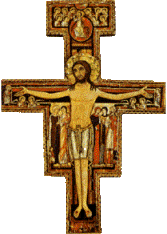[This post is a revised reflection. Peace and all good, Tausign]
"We are mothers when we carry him in our heart and body through divine love and a pure and sincere conscience; we give birth to him through a holy life which must give life to others by example." -St. Francis of Assisi-
"We are mothers when we carry him in our heart and body through divine love and a pure and sincere conscience; we give birth to him through a holy life which must give life to others by example." -St. Francis of Assisi-
One of the greatest joys of our mortal existence is to experience the 'immanence' of God. The 'incarnation' of Christ means that which is pure 'Spirit' enters into our humanity in every way except sin. God could have stayed 'outside' of creation: 'non-incarnate' and aloof. But He didn't.
Not only that, but all of Creation can now rejoice because the Creator has revealed himself in its midst. The Canticle of the Creatures, throws new light on a sublime relationship. The sun and the moon could always give glory to their Creator, but they did so as material evidence of the Creator's work. But now because Jesus has looked upon them with his human eyes and felt the warmth on his human skin, they become 'transformed', if you will, with all of Creation. All of Creation 'praises' the 'eternal God' through Jesus. All in Creation are related to each other as kin, through Jesus.
Mary's role in all of this is the basis for St. Francis' undying devotion to her. The early writers say The Poverello loved her with what is called 'inexpressible love'. Her loving fiat, 'be it done unto me according to thy word', is the indispensable cooperation of Mary for the human family. She is the gateway to incarnation of the divine Person of Jesus.
It wouldn't hurt to occasionally ponder what having 'God incarnate' means to us as pilgrims in the temporal order. First of all, Jesus reveals how we are related to God in new terms. The Eternal Son, touches us: he becomes our 'brother', sharing with us his mother; and makes a transcendent God, our 'Father'; even 'Abba'. We share in 'his life' because he has taken on ours.
For St. Francis, Mary herself is a beautiful hymn proclaiming humility and exaltation together as a single chord. She is 'humble', as divine handmaid, completely open to the goodness of God. Her 'exaltation' is the received dignity due the mother of God. 'The Almighty has done great things for me...' Indeed, all generations will call her 'Blessed'.
Though we haven't received her singular graces, nevertheless, our Heavenly Father, in his providence provides what we need to accomplish his will for us. So in recalling the refrain of St. Francis stated above, we should count on the Holy Spirit through Mary, to bring about the 'birth' of Jesus in ourselves. To 'carry Jesus in our hearts and body' and to have him 'give life to others by our example' means necessarily our own dying to ourselves. This is of course the sticking point: the need to accept a baptism of death to our worldly way of life; and a rising to new life in Christ Jesus.
God can move deeply into our lives: but not without our consent. Our Heavenly Father has chosen us for something special; to carry His Son and to reveal Him to others. And if a thousand billion others are called to the very same task it still is glorious to undertake. I'm speaking of course of the awesome task of being 'mother to our Lord Jesus Christ'.





1 comment:
Beautiful post, finally got to read it! Peace to you, and have a Blessed and Merry Christmas!
Post a Comment